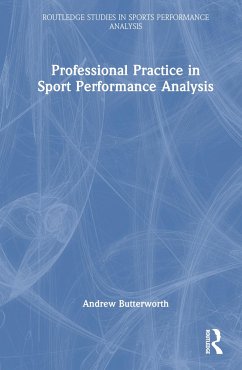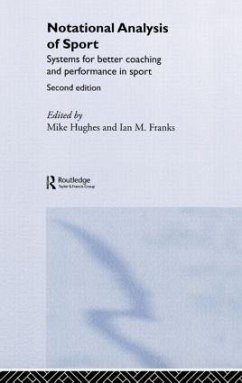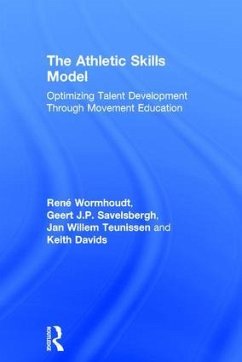Systems Thinking Methods in Sport
Practical Guidance and Case Study Applications
Versandkostenfrei!
Versandfertig in 1-2 Wochen
Weitere Ausgaben:

PAYBACK Punkte
91 °P sammeln!





This book presents a practical guide to applying contemporary systems thinking methods in sport, as well as case study applications demonstrating how their outputs can be translated in practice.
Scott McLean, PhD, is a Senior Research Fellow and the research theme leader for Sport and Outdoor Recreation in the Centre for Human Factor and Sociotechnical Systems at the University of the Sunshine Coast. He holds a bachelor's degree in sport and exercise science, a master's degree in exercise physiology, and a PhD in human factors and ergonomics in sport. Scott's research spans a broad range of domains, including sport science, safety science, systems thinking, and complexity science. He has strong collaborations in sport and has worked and conducted research with multiple national and international sporting organisations, including the World Anti¿Doping Agency, Sport Integrity Australia, the Australian Institute of Sport, Athletics Australia, Cycling Australia, the French Anti¿Doping Agency, Sport and Recreation Victoria, the English Institute of Sport, Scottish Rugby Union, the Defence Science and Technology Group, St Kilda AFL Club, Brisbane Roar Football Club, Sunshine Coast Lightning Netball, and UniSC Para Sport. Mitchell Naughton, PhD, is an Associate Lecturer in exercise physiology at the University of Newcastle (Australia). He has undergraduate and postgraduate degrees in sport and exercise science and earned a PhD from the University of the Sunshine Coast Centre for Human Factors and Sociotechnical Systems, where he investigated the influence of external loads on post¿match fatigue in collision sport athletes. He has over ten years of applied and research experience in the areas of performance analysis, sports science, and exercise physiology. He has presented at leading international and national sports science conferences and maintains an active research profile with international collaborators across a range of domains, including sport, physical activity, defence, and occupational settings. Gemma J.M. Read, PhD, is the Director of the Centre for Human Factors and Sociotechnical Systems at the University of the Sunshine Coast. She has degrees in behavioural science and law and earned a PhD from the Monash University Accident Research Centre. She has over 16 years' experience applying human factors and systems thinking methods in both academia and government roles. Her work spans a range of domains, including transportation, healthcare, construction, defence, sport, and outdoor recreation, and her research has been recognised by awards from the UK Chartered Institute of Ergonomics and Human Factors, the US Human Factors and Ergonomics Society, and the Australian Aviation Psychology Association. Neville A. Stanton, PhD, DSc, is a chartered psychologist, chartered ergonomist, and chartered engineer. He is Professor Emeritus of Human Factors Engineering in the Faculty of Engineering and Physical Sciences at the University of Southampton in the UK. He has degrees in occupational psychology, applied psychology, and human factors engineering, and he has worked at the Universities of Aston, Brunel, Cornell, and the Massachusetts Institute of Technology. His research interests include modelling, predicting, analysing, and evaluating human performance in systems as well as designing the interfaces and interaction between humans and technology. Professor Stanton has worked on the design of automobiles, aircraft, ships, and control rooms over the past 30 years on a variety of automation projects. He has published 60 books and over 400 journal papers on ergonomics and human factors. In 1998, he was presented with the Institution of Electrical Engineers Divisional Premium Award for research into system safety. The Institute of Ergonomics and Human Factors in the UK awarded him The Otto Edholm Medal in 2001, The President's Medal in 2008 and 2018, The Sir Frederic Bartlett Medal in 2012, and The William Floyd Medal in 2019 for his contributions to basic and applied ergonomics research. The Royal Aeronautical Society awarded him and his colleagues the Hodgson Prize in 2006 for research on design¿induced, flight¿deck errors published in The Aeronautical Journal. The University of Southampton has awarded him a Doctor of Science in 2014 for his sustained contribution to the development and validation of human factors methods. Adam Hulme, PhD, is an Australian Research Council DECRA Fellow specialising in the use of systems science methods at the University of Queensland, Brisbane, Australia. He holds a BSc in sport and exercise science, an honours in sports psychology, a master's in health promotion, and a PhD in epidemiology and systems human factors in the area of sports injury aetiology. His doctoral programme was completed at an International Olympic Committee (IOC) world¿leading research centre in sports injury prevention. He has an extensive list of research publications in sport, including a world¿first complex systems microsimulation. In addition to sport, Dr Hulme has applied and evaluated systems thinking methods across multiple sociotechnical system domains, and he cödeveloped the AcciNet method with collaborators at the Centre for Human Factors and Sociotechnical Systems. Guy H. Walker, PhD, is a Professor within the Centre for Sustainable Road Freight at Heriot¿Watt University in Edinburgh. He lectures on transportation engineering and human factors. He is the author or cöauthor of over 100 peer¿reviewed journal articles and 18 books. He has been awarded the Institute for Ergonomics and Human Factors (IEHF) President's Medal for the practical application of ergonomics theory and Heriot¿Watt's Graduate's Prize for inspirational teaching. Dr Walker has a BSc Honours degree in psychology from the University of Southampton and a PhD in human factors from Brunel University. He is a fellow of the Higher Education Academy, a fellow of the Chartered Institute of Ergonomics and Human Factors, and a member of the Royal Society of Edinburgh's Young Academy of Scotland. His research has featured in popular media from national newspapers and television and radio programmes through to an appearance on the Discovery Channel. Paul M. Salmon, PhD, is a Professor in human factors at the Centre for Human Factors and Sociotechnical Systems at the University of the Sunshine Coast. Paul has over 20 years' experience of applied human factors and systems thinking research in areas such as road and rail safety, aviation, defence, sport and outdoor recreation, healthcare, workplace safety, and cybersecurity. His research has focused on understanding and optimising human, team, organisational, and system performance through the application of human factors and systems theory and methods. He has cöauthored 22 books, over 300 peer¿reviewed journal articles, and numerous book chapters and conference contributions. According to The Australian Research Magazine , since 2020 Paul has been Australia's number¿one researcher in the field of quality and reliability. Paul's contribution has been recognised through various accolades, including the Chartered Institute for Ergonomics and Human Factor's 2019 William Floyd Award and 2008 President's Medal, the Human Factors and Ergonomics Society Australia's 2017 Cumming Memorial Medal, and the International Ergonomics Association's 2018 Research Impacting Practice Award.
Produktdetails
- Verlag: Routledge
- Seitenzahl: 252
- Erscheinungstermin: 26. September 2024
- Englisch
- Abmessung: 250mm x 175mm x 18mm
- Gewicht: 620g
- ISBN-13: 9781032194981
- ISBN-10: 1032194987
- Artikelnr.: 70149902
Herstellerkennzeichnung
Libri GmbH
Europaallee 1
36244 Bad Hersfeld
gpsr@libri.de
"Systems thinking in sport is an essential read for all of those interested in understanding complex problems in high performance. The book provides a fantastic outline of the methodological approaches that can be used to both collect and analyse data to create insights from a systems thinking perspective. Each chapter provides content that is easy to understand and use. This makes it a brilliant resource for those like me who are interested in these research approaches but have little experience in the range of techniques that can be used or how to use them. As such, the book is a "one stop shop" in its ability to provide comprehensiveness in one volume. This is definitely an essential text for those thinking a little differently about
Mehr anzeigen
research in sport and exercise science."
Professor Barry Drust, Director of The Graduate School of Sport and Professional Practice. School of Sport, Exercise and Rehabilitation Sciences. University of Birmingham.
"Complexity and systems problems exist throughout all aspects of athlete preparation in elite sports. This book provides a brilliant practical guide to understanding the fundamental structure of many of these issues. This book gave me a deeper appreciation for the true cause of problems in sport and signposted ways to solve them.
This is a fascinating and highly influential book from authors with a great breadth of experience within and outside of elite sports. Having read this, I now see systems problems everywhere. Incredibly useful!"
Patrick Hogben. Head of Strength and Conditioning, Atlanta Hawks, National Basketball Association (NBA).
Professor Barry Drust, Director of The Graduate School of Sport and Professional Practice. School of Sport, Exercise and Rehabilitation Sciences. University of Birmingham.
"Complexity and systems problems exist throughout all aspects of athlete preparation in elite sports. This book provides a brilliant practical guide to understanding the fundamental structure of many of these issues. This book gave me a deeper appreciation for the true cause of problems in sport and signposted ways to solve them.
This is a fascinating and highly influential book from authors with a great breadth of experience within and outside of elite sports. Having read this, I now see systems problems everywhere. Incredibly useful!"
Patrick Hogben. Head of Strength and Conditioning, Atlanta Hawks, National Basketball Association (NBA).
Schließen
Für dieses Produkt wurde noch keine Bewertung abgegeben. Wir würden uns sehr freuen, wenn du die erste Bewertung schreibst!
Eine Bewertung schreiben
Eine Bewertung schreiben
Andere Kunden interessierten sich für














